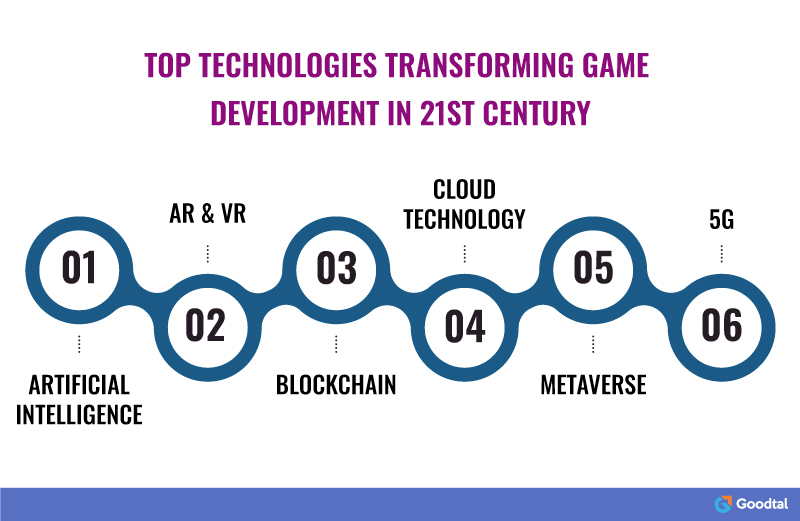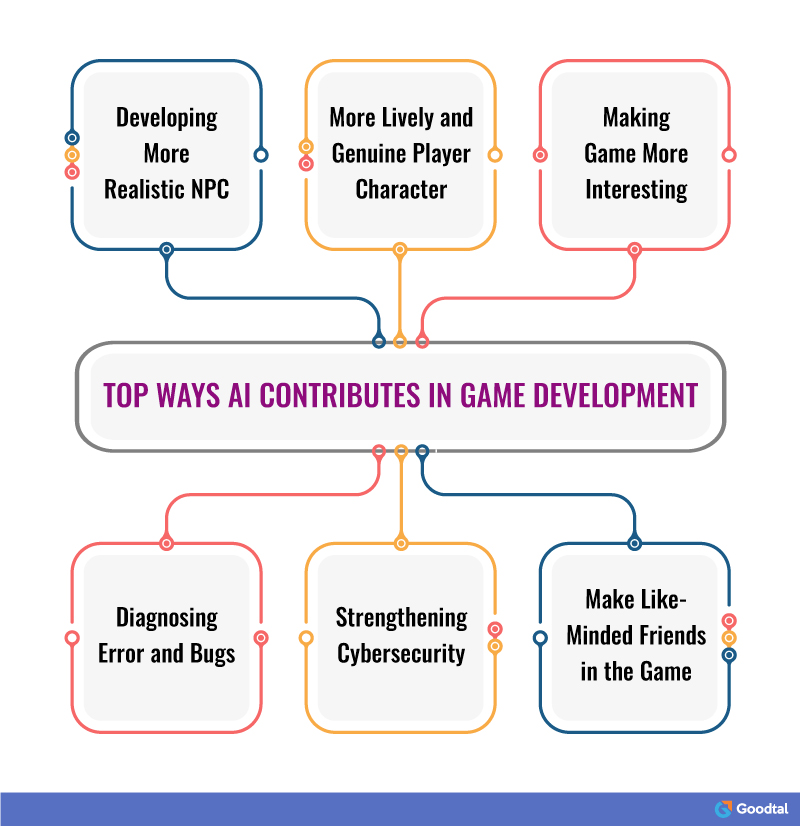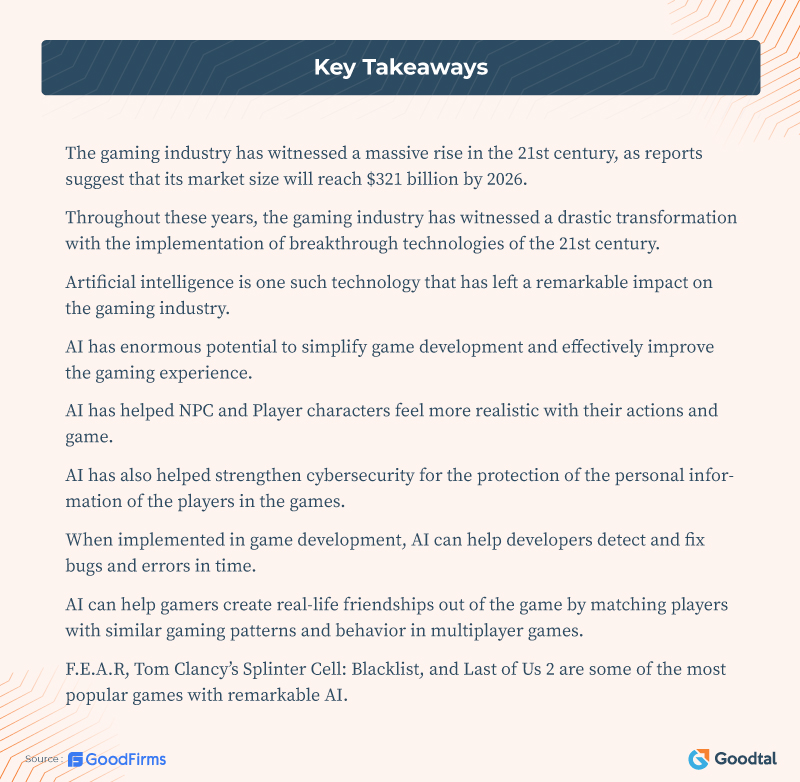
Games have been one of the most prevalent forms of entertainment for people of every age. With the rise in digitalization, games have taken new forms, from boards and cards to smartphones and gaming consoles.
Top game developers are experimenting with new technologies to improve gamers' gaming experience and to stand out from the competition.
The gaming industry has become a very significant industry today. Based on reports, it's anticipated that the gaming industry will reach $321 billion by 2026 following the rapid growth it's been witnessing at present. With the surge in the gaming industry's valuation, there has been a rise in game development for various devices such as smartphones, tablets, laptops, and PCs.
In this post, we'll discuss Artificial Intelligence in game development. This implementation has significantly transformed the gaming industry by proving itself capable of improving the gaming experience. So, let's move forward and discuss AI in game development and how it benefits the industry.
A Brief Overview of Game Development
With the rise in the craze of games and adding to it the importance and growing popularity of gaming competitions on international platforms as a real thing, just like sports tournaments, gaming is becoming more than just what our elders considered it to be. With the rise in game development today, millions of video games are available on app stores and in the form of console games.
The gaming world has created its sets of essential products, such as gaming consoles, microphones, VR headsets, etc., to provide a real-world gaming experience.

Game development has significantly transformed via its integration with up-and-coming technologies such as Metaverse, Augmented & Virtual Reality, amongst many others. In this post, we’ll talk about one such technology, AI, whose implementation in game development has made a game-changing transformation in the gaming world. Before moving to that, let’s first get a brief overview of AI technology.
Suggested Reading: Game Development Trends and Languages in 2022
A Brief Overview of AI
Artificial Intelligence has become an extensively spoken technology these days, owing to its rapid adoption, range of applications, and benefits. Owing to its booming popularity, the AI market is growing exponentially, and based on Bloomberg's predictions, it'll reach $422.37 billion by 2028, up from the $59.67 billion valuation in 2021.
AI has found itself to be of massive value in various sectors, namely, healthcare, education, ecommerce, cybersecurity, retail, logistics & shipments, among many others. This technology has benefited all these industries by facilitating operations automation and boosting the workforce's working efficiency and productivity.
Moreover, AI has proven game-changing by transforming customer services and experience. Just like in all the mentioned sectors, AI holds excellent opportunities in the gaming sector.
What Ways AI Contributes to Improving the Gaming Experience
Artificial Intelligence is a technology that makes machines think and act like humans. This is the most important feature of AI that makes a difference in improving the gaming experience. Let's learn in detail some of the most important contributions and differences that AI creates with its implementation in game development.

#1 Developing Human-Like NPCs (Non-playing Characters)
NPC is a ubiquitous term in the gaming world, and it stands for non-playing character. It refers to the other characters or, say, opponents in the game, which are not controlled by the player and are usually controlled by computers.
Before the introduction of AI, NPCs were pre-programmed and used to play against the real player in a way they were programmed to. These characters could play with limited skills, and players most often were able to beat them. In contrast, AI-powered NPCs will not only depend on their pre-programming but will also learn from their playing experience as they go further.
AI & ML technologies engrave the ability to think and learn in these non-playing characters so that they can think in the same way real players do and give them tough fights depending on the scenario they face. Strong non-playing characters who can change their gaming tactics as normal humans can make games more interactive, improving the gaming experience.
#2 More Lively and Genuine Player Character
Keeping aside the non-playing characters, the character that portrays the role of the player in the game (player character) plays an important role as well. It's crucial in order to provide a better gaming experience that the player character seems lively and genuine. As such, I mean to say that the character portrayal of players should seem natural and mimic the player's behavior and gestures.
Consider a scenario where multiple players who might be a group of friends or total strangers are playing together. AI can analyze players' behavior and help developers design the program so that every expression of the actual player is cast upon the relevant character. This will make gaming fun, and help players understand other players' reactions at every stage of the game.
#3 Making Game More Interesting
AI can help a great deal in making games more exciting and challenging while maintaining its simplicity and potential for the player to win the game. AI & ML can be used to monitor the player's mood and his game progress constantly. Based on that data, AI can automatically curate new challenges at the same level to make the game a little more challenging. For example, introducing distractions or obstacles in the path makes the game more fun and challenging.
AI can also, at the same time, monitor the situation of the player in the game and his mood; if it becomes too challenging for the player, it can introduce some hints to make it harder for them to quit without winning the game. This way, AI & ML can help game developers curate the best gaming experience for their players.
Suggested Reading: How Game Developers Can be Game Changers for You?
#4 Diagnosing Errors and Bugs
In the game development stage, it's crucial to diagnose bugs and any loopholes that the game might have in real-time rather than at the end once it's deployed. AI-powered testing tools can do the work once integrated with the testing environment of the game development.
If missed, a minor loophole or error can create significant issues in the gaming software after deployment. But AI-powered testing tools can minimize the chances of such mishaps by raising the alarm at the right time. These tools can automate the whole process of testing and can detect bugs and errors in real-time, thereby reducing the burden on the workforce and the overall costs and time spent on fixing bugs.
#5 Strengthening Cybersecurity
Cybersecurity is emerging as one of the severe concerns these days with the increase in data volume. Every service provider, be it a website, an app, or any online resource today, asks for personal data sometimes to verify us and often as a protocol. The same thing continues with gaming apps as well; they contain much user-sensitive information ranging from payment details and location access to storage access.
Protecting this information should be a priority for every game developer. These days, game developers often try to include advertisements in the middle of the games to earn some profits. In such cases where third parties are involved, protecting your user from data theft becomes more critical.
Employing AI-powered security systems in game development can help protect sensitive data from going to third parties. Artificial intelligence has proven itself to be a worthy player in the field of cybersecurity. An AI-powered authentication system can be installed to authenticate the player. Meanwhile, AI-powered systems can also raise flags as well as take action at times when suspicious activity carried out by third-party advertisers is sensed.
#6 Make Like-Minded Friends in the Game
While playing online games, we often encounter strangers that we love to play with. Due to security reasons, game developers decide to keep the players' real names and other common personal data confidential. Here, AI can analyze the player's behavioral patterns and related stats.
Using the collected analytics, the game itself can prescribe the player with suggestions of other players with the same playing patterns and rank. This, in turn, makes the game more interesting by establishing new connections between players. It can prove very beneficial, especially for introverts who can make great compatible friends on the gaming platforms; this is how the game can help create meaningful connections.
Top Use Cases of AI in Game Development
Now, let's discuss some of AI's most successful use cases in game development.
Tom Clancy’s Splinter Cell: Ubisoft
Ubisoft is one of the popular game developers experimenting with AI to ease game development by catching bugs before the developer is about to create them. Their AI system will alert the developers before they are about to make errors while writing the code. Currently, this gaming giant is working on an initiative called Ubisoft La Forge, which aims to find ways to implement AI in their game development to make more fun, realistic and robust apps. Along with finding bugs, Ubisoft aims to create more genuine NPCs.
One of the top-rated games, Tom Clancy’s Splinter Cell: Blacklist, created by this company, is known for its lively NPCs in the form of patrolling guards. The AI is made to listen and act on every move the player makes in the game. For example, if one guard goes to check out the player’s whereabouts after listening to the noise, other NPC/guards will enter the attack state if he sees the player and attacks him at once. This is how Ubisoft has created some genuine NPCs that make this iconic game more lively.
F.E.A.R by Monolith Productions
F.E.A.R. (First Encounter Assault Recon), developed by Monolith Productions, is one of the most successful examples of AI-powered games. F.E.A.R. has showcased some of the most impressive forms of A.I. in the game of its non-player characters. Like most AI-controlled games, F.E.A.R. uses F.S.M. and A*, the most common A.I. techniques used to control character behavior and planning paths, respectively. But it uses these two more productively.
F.E.A.R. uses A* not just for path planning but also for planning the action sequence. This is the crucial reason why AI-controlled N.P.C.s of this game are like none; these N.P.C.s are capable of even saving themselves from fire and creating a false scenario where all the N.P.C.s seem to be attacking together by positioning themselves nearby.
Last of Us 2 by Sony Entertainment
The Last Of Us series is one of Sony entertainment's most successful game series. The latest version of this series, Last Of Us 2, has used AI effectively to make the game and characters feel more realistic. Unlike other games, the series' enemies or NPCs look more realistic and revengeful. In most games, NPCs are made alert of the player's presence when any movement or kill is made only for a short alert time.
But in this series, the advanced AI is used so that once a player is detected, NPCs get alert and hostile as long as they don't find the enemy/player; they termed their condition "vague awareness." Thus making the game more challenging and making NPCs feel real, similar to playing a multiplayer game.
To Conclude
Games have been subject to constant change throughout the decades. If you look back, remember the days when the only way to play games was with board games or video game cassettes with consoles? With time today, some of the most complex games could fit into our pockets with a smartphone as media. The game development industry is witnessing rapid growth, thus paving the way for stricter competition to create the most unique and breakthrough games.
This post discussed how AI in game development improves the gaming experience. Game development companies, as already discussed, are experimenting with new technologies to make games more fun and appealing and AI, aka Artificial Intelligence, is one such technology that promises the most striking results. We also looked at some of the most successful games that use AI.

